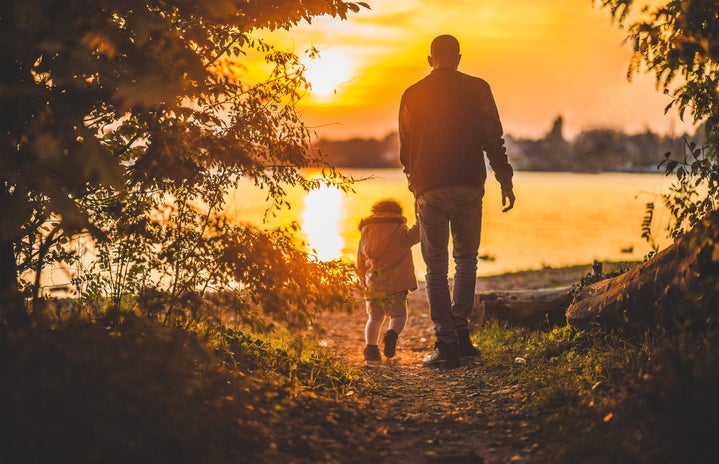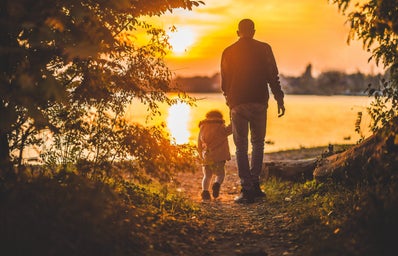The pain of losing a parent is unimaginable. If you’ve lost a parent, you know this to be true. Even if you haven’t, I’m sure you can imagine what it might be like, but only for a second — because even the thought of it feels real and insurmountable.
Grief is portrayed everywhere in our lives. We see it in the media, in pop culture and we watch our friends and family experience its ebbs and flows. You’d think this would make us more prepared to experience grief in our lives; but this is far from the truth.
My dad was not a constant figure in my life. Do you know those memories that you have from when you were a kid where the details are really fuzzy, but you can still remember bits and pieces? That’s how I would describe all of the memories I have with my dad. Visits were few and far between. I can picture them, but I can’t quite get all the details right. Hate was never a feeling I had for my dad, but indifference definitely was. It never really made sense to me how you could have a child and not want to be a part of their life? To be honest, it still doesn’t make sense to me. It’s for this reason I thought that feeling of indifference would remain for the rest of my life.
When I found out that my dad was not going to recover from COVID-19, everything changed. Years of pretending the absence of my father did not affect me manifested itself in agonizing pain. When you are a child, you tend to accept things at face value and find a way to cope because it seems like the only way to survive. But once I reached adulthood, I started having a harder time accepting the things I never really understood as a child — the absence of my father and my apathy towards him being one of those things. I spent the first two years of college thinking about my dad more than I had in my entire life. And every time I almost convinced myself that I would visit him the next time I was home, I found a better excuse as to why it could wait.
There is nothing that feels normal about losing your dad at the age of 20 — especially not in the middle of a pandemic. In the past two months I have learned invaluable lessons and shifted my thought in ways I did not think would ever be possible for myself. I wanted to chronicle this process not only to remember and honor my feelings, but to share what I’ve learned and what has helped me to find the silver living in this unthinkable circumstance.
Grief makes people uncomfortable. Give grace to those who say the wrong things or who say nothing at all.
You begin to realize how isolating grief is after the initial wave of condolences end. People continue on with their daily lives while you stay paralyzed in your grief. You might expect people to check up on you and be disappointed when they don’t. Don’t place expectations on the people in your life and the role you think they will play in your grieving process. No one can truly know what you are feeling; it’s inevitable that people will occasionally say the wrong thing at the wrong time or say nothing when you need them to say something.
Don’t burn bridges. Don’t hold grudges. And don’t wait to tell someone that you love them.
In the back of my mind I always thought that my dad and I might be able to have a relationship once I was older. I imagined that we could’ve made up for lost time. I would know his favorite song, his favorite food to eat and his favorite jokes to tell. Thinking you have a lifetime to live with someone and having it taken away stifles you. I don’t know what a potential relationship with my dad would’ve looked like, but now I will never know. As cliché as it sounds, you are only guaranteed the moment you are living right now. Make those moments count.
Have compassion. There is a person behind every action.
In the past two months, my apathy towards my dad has transformed into a deep understanding and sadness. My father was more than the absent parent that I saw him as. He had a past, struggles and many demons to overcome. I won’t use his circumstances to make excuses for him; but I will use my understanding of them to find forgiveness, love and compassion. My father was one million times more good than he was bad, and I wish I could go back in time and tell him that I knew all of that and so much more.
You should never be embarrassed by your circumstances or where you come from.
Growing up, I did not have friends with divorced parents and it felt like something I couldn’t talk about. And frankly, it was something I didn’t want to talk about. I was embarrassed to have an absent black father that seemed to fit a stereotype and I tried not to think of how my situation was perceived in the eyes of others. With the help of an ancestry.com subscription and long conversations with my mom, I’ve learned there’s plenty to be proud of. I am the descendant of slaves, slave owners, farmers, entrepreneurs, doctors and so much more. Learning who I come from has been very healing for me and helped me to gain pride in being biracial; and throughout this process I’ve been able to learn just how similar I am to my dad, even though he didn’t have a direct influence on my life.
I know I will be grieving my father for a lifetime. When I hear my peers complain about their dads, I will cringe. When I hear people mock COVID-19 and spin conspiracies, I will be sickened. When I hear people spew microaggressions and make racist comments, I will be hurt. And as I reach milestones in my life, I will picture my dad and imagine how he could’ve fit into the puzzle. Grief changes you, that is undeniable. But I am determined to make that change a meaningful one.



